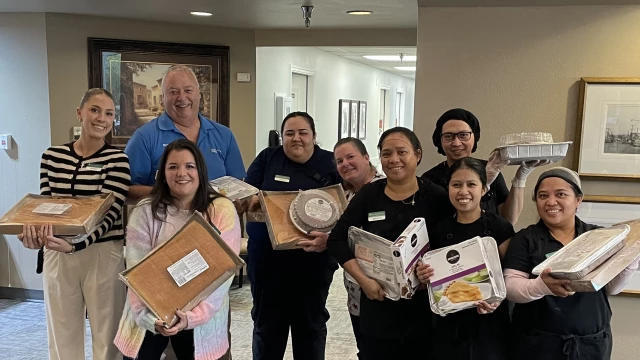Better Homes & Gardens By Karla Walsh | April 20, 2020
Step aside, social media. Handwritten notes are having a moment to brighten the day for seniors, the immunocompromised, and others in solo isolation during the coronavirus pandemic.
Just because we’re social distancing doesn’t mean we need to practice emotional distancing, too. In fact, it’s more important than ever for those who need to quarantine as much as possible to still feel the love. Research proves that even in normal times (and now is far from normal), one in four people feel lonely on a regular basis. And loneliness may be as detrimental for your health as smoking or obesity, scientists have found.
To stay connected while we #stayhome, residential facilities for seniors and individuals with mental disabilities have launched pen pal programs. Many are in partnership with school-age kids who could use a little extra writing practice—and a few more free time activities since their extracurriculars have been put on hold.
“We decided to create our Village Concepts Pen Pal Program as soon as we knew we needed to social distance and the schools were out,” says Danie Monaghan, director of operations at Village Concepts senior community in Auburn, Washington. “I saw the immediate impact on both my small children and the residents that we serve. From there it was easy to find both children and seniors who wanted to participate.”
The pen pal program has become more important than Monaghan or any of her colleagues could imagine. (By the way, mail is highly unlikely to spread the virus, but to be safe, it may be best for young, healthy individuals to open the letters, wash hands, then pass them along to any seniors or immunocompromised people.)
“We have residents that are in isolation and they have a connection to the outside world again. They wait for the letters and cards from the children and they sit in a socially-distant circle and open them together,” she says.
Maelyn Benedict, one of the Village Concepts student pen pal participants to her senior buddy: “I’m sorry that I can’t come see you. I pray that when the coronavirus goes away, families can get back together.” In other letters, pen pals exchange drawings, cookie recipes, photos, and more, and connect about everything from 18-wheeler trucks to pets to favorite foods.
“I felt loved and wanted. It’s important for everyone to feel those two things in life,” says Donna Hecker, one of the Village Concepts residents.
Similar programs are popping up everywhere from Australia and Europe to Madison, Connecticut, and Austin, Texas.
“We launched our pen pal program in mid-March and continue matching our seniors with pen pals each day,” says Austin Hall, director of senior services for the town of Madison, Connecticut. “If seniors live alone, it’s an extremely lonely time since they can’t see their friends or family in the flesh right now. Loneliness is a horrible feeling. Having a pen pal gives a senior a way to feel needed, checked in on, and something to look forward to.” The seniors aren’t the only ones who benefit, Hall says. The kids learn compassion from their sage pals and get a peek into the past, while the seniors score some much-needed companionship.
Having a pen pal gives a senior a way to feel needed, checked in on, and something to look forward to.
– AUSTIN HALL
At Marbridge, a residence for 265 individuals with a range of cognitive disabilities in South Austin, Texas, the campus closed to visitors, families, and volunteers on March 12. That day, the staff worked on enlisting their current volunteers and anyone else willing to become snail mail buddies for their residents. “It gives our residents a social outlet in a way that feels safe,” says Becca McPherson, vice president of development at Marbridge.
Even prior to the pandemic, Marbridge residents endured years of isolation due to their cognitive challenges. Once they moved to the facility, though, “life opened up in ways that many families couldn’t imagine for their loved ones. New friendships are formed, independent living skills are developed through group outings, university athletic events, and Special Olympics sports,” McPherson says.
That all changed when off-campus activities came to a halt in March, and visitors were restricted.
“Pen pals provide some insight into what others are going through, some humor relief through jokes, and ensure that social isolation doesn’t happen,” McPherson adds. “I know that the people writing to us to become pen pals continue saying how grateful they are to have this outlet for themselves, but their willingness to be a part of this program is therapeutic on all ends.”
Even after the general public starts easing back into more usual activities, most of those living in these facilities will be among the last to return to “normal” due to their medical vulnerabilities.
“Letting our residents know how much they are thought of and that the world continues to care for their well-being will make all the difference,” McPherson says.
How You Can Help
There’s more than enough stamps and cute cards for all to get involved. Contact your local residential facilities, or here’s how you can join the efforts mentioned above.
You don’t even need a stamp or pen to take part in the #CareNotCOVID movement, launched by the American Health Care Association and the National Center for Assisted Living. It allows you to record a video message to send support to someone in an assisted living residence or nursing home.
Marbridge
Send letters to residents or notes of encouragement to the staff at:
Marbridge Foundation
P.O. Box 2310 Bliss Spillar Road
Manchaca, Texas 78652
Village Concepts
Send letters to the home office to have them sent out to the community members:
Village Concepts
2020 A Street SE, Suite 101
Auburn, Washington 98002
Madison Senior Pen Pal Program
Email noblinh@madisonct.org to get your pen pal match.






